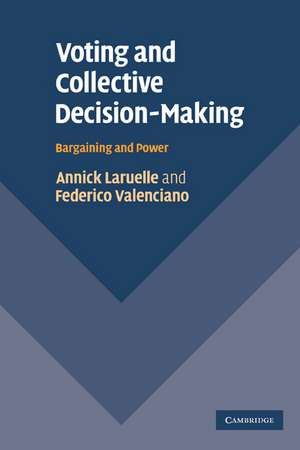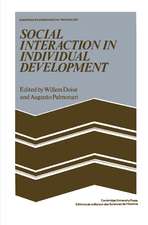Voting and Collective Decision-Making: Bargaining and Power
Autor Annick Laruelle, Federico Valencianoen Limba Engleză Paperback – 16 feb 2011
| Toate formatele și edițiile | Preț | Express |
|---|---|---|
| Paperback (1) | 330.71 lei 6-8 săpt. | |
| Cambridge University Press – 16 feb 2011 | 330.71 lei 6-8 săpt. | |
| Hardback (1) | 524.13 lei 6-8 săpt. | |
| Cambridge University Press – 10 sep 2008 | 524.13 lei 6-8 săpt. |
Preț: 330.71 lei
Nou
Puncte Express: 496
Preț estimativ în valută:
63.29€ • 65.70$ • 52.77£
63.29€ • 65.70$ • 52.77£
Carte tipărită la comandă
Livrare economică 24 martie-07 aprilie
Preluare comenzi: 021 569.72.76
Specificații
ISBN-13: 9780521182638
ISBN-10: 0521182638
Pagini: 204
Dimensiuni: 152 x 229 x 11 mm
Greutate: 0.28 kg
Editura: Cambridge University Press
Colecția Cambridge University Press
Locul publicării:Cambridge, United Kingdom
ISBN-10: 0521182638
Pagini: 204
Dimensiuni: 152 x 229 x 11 mm
Greutate: 0.28 kg
Editura: Cambridge University Press
Colecția Cambridge University Press
Locul publicării:Cambridge, United Kingdom
Cuprins
List of figures; Preface; 1. Preliminaries; 2. Seminal papers, seminal ambiguities; 3. Take-it-or-leave-it committees; 4. Bargaining committees; 5. Application to the European Union; Index.
Recenzii
Review of the hardback: 'There are many books on voting rules and power indices, but Laruelle and Valenciano are unique in tracing the ideas back to fundamental notions in game theory. This book will be an indispensable aid to those who research in this area.' Ken Binmore, Emeritus Professor of Economics, University College London
Review of the hardback: 'The authors do an excellent job of developing a framework, founded in utility theory and game theory, for analyzing the nature of yes/no collective decisions and offering prescriptions for improving them. They suggest how the power and satisfaction of voters may be measured and assess the impact of voting rules, showing how their theory helps one understand the consequences of real-world choices, particularly by the European Union.' Steven J. Brams, New York University and author of Mathematics and Democracy (2008)
Review of the hardback: 'With this book, Laruelle and Valenciano give us an extremely useful synthesis that goes deep into the understanding of power measurement and collective decision-making and provides new insights into many issues. The various measures of power and the different approaches that one finds in the literature are elegantly put into perspective. This book will become a classic in the field.' Marc Fleurbaey, Research Director, CNRS and University of Paris Descartes
Review of the hardback: 'Annick Laruelle and Federico Valenciano provide an illuminating and timely analysis of voting rules. By re-examining bargaining power and influence from a game theoretic perspective on the multilateral bargaining that goes on in committees, the authors provide new insights into the properties of voting systems and their optimal design. This is a monograph that should be of significant interest to both researchers on collective decision-making and designers of voting rules.' Matthew Jackson, William D. Eberle Professor of Economics, Stanford University
Review of the hardback: 'Annick Laruelle and Federico Valenciano are prominent scholars in the applied game theory community. In their new book, they suggest a novel approach to collective choice in dichotomous (yes/no) settings, one based on distinguishing between voting and bargaining committees. The traditional voting power concepts are thereby seen in a new light. The book makes very enlightening and thought provoking reading.' Hannu Nurmi, Academy Professor, Academy of Finland
Review of the hardback: '… should be of interest to students and researchers in political and social science, as well as in game theory and economics. The level of formalization is low enough not to discourage readers with less mathematical background but at the same time high enough to be precise.' Zentralblatt MATH
Review of the hardback: 'The authors do an excellent job of developing a framework, founded in utility theory and game theory, for analyzing the nature of yes/no collective decisions and offering prescriptions for improving them. They suggest how the power and satisfaction of voters may be measured and assess the impact of voting rules, showing how their theory helps one understand the consequences of real-world choices, particularly by the European Union.' Steven J. Brams, New York University and author of Mathematics and Democracy (2008)
Review of the hardback: 'With this book, Laruelle and Valenciano give us an extremely useful synthesis that goes deep into the understanding of power measurement and collective decision-making and provides new insights into many issues. The various measures of power and the different approaches that one finds in the literature are elegantly put into perspective. This book will become a classic in the field.' Marc Fleurbaey, Research Director, CNRS and University of Paris Descartes
Review of the hardback: 'Annick Laruelle and Federico Valenciano provide an illuminating and timely analysis of voting rules. By re-examining bargaining power and influence from a game theoretic perspective on the multilateral bargaining that goes on in committees, the authors provide new insights into the properties of voting systems and their optimal design. This is a monograph that should be of significant interest to both researchers on collective decision-making and designers of voting rules.' Matthew Jackson, William D. Eberle Professor of Economics, Stanford University
Review of the hardback: 'Annick Laruelle and Federico Valenciano are prominent scholars in the applied game theory community. In their new book, they suggest a novel approach to collective choice in dichotomous (yes/no) settings, one based on distinguishing between voting and bargaining committees. The traditional voting power concepts are thereby seen in a new light. The book makes very enlightening and thought provoking reading.' Hannu Nurmi, Academy Professor, Academy of Finland
Review of the hardback: '… should be of interest to students and researchers in political and social science, as well as in game theory and economics. The level of formalization is low enough not to discourage readers with less mathematical background but at the same time high enough to be precise.' Zentralblatt MATH
Descriere
A study of the theory of bargaining and voting power and how it applies to real decision-making contexts.







